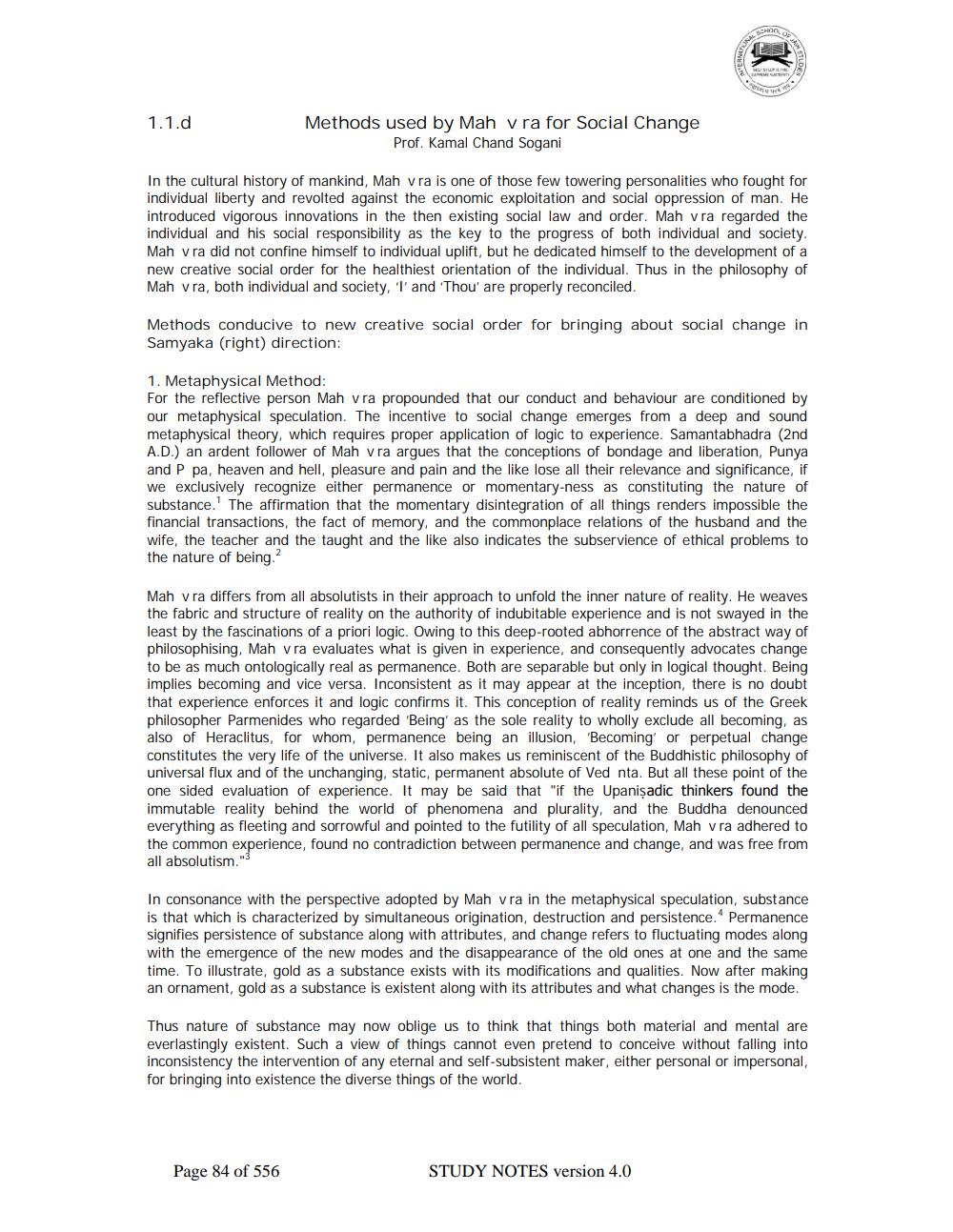________________
1.1.d
Methods used by Mah v ra for Social Change Prof. Kamal Chand Sogani
In the cultural history of mankind, Mah vra is one of those few towering personalities who fought for individual liberty and revolted against the economic exploitation and social oppression of man. He introduced vigorous innovations in the then existing social law and order. Mah vra regarded the individual and his social responsibility as the key to the progress of both individual and society. Mah vra did not confine himself to individual uplift, but he dedicated himself to the development of a new creative social order for the healthiest orientation of the individual. Thus in the philosophy of Mah v ra, both individual and society, 'I' and 'Thou' are properly reconciled.
Methods conducive to new creative social order for bringing about social change in Samyaka (right) direction:
1. Metaphysical Method:
For the reflective person Mah vra propounded that our conduct and behaviour are conditioned by our metaphysical speculation. The incentive to social change emerges from a deep and sound metaphysical theory, which requires proper application of logic to experience. Samantabhadra (2nd A.D.) an ardent follower of Mah vra argues that the conceptions of bondage and liberation, Punya and P pa, heaven and hell, pleasure and pain and the like lose all their relevance and significance, if we exclusively recognize either permanence or momentary-ness as constituting the nature of substance. The affirmation that the momentary disintegration of all things renders impossible the financial transactions, the fact of memory, and the commonplace relations of the husband and the wife, the teacher and the taught and the like also indicates the subservience of ethical problems to the nature of being.2
Mah v ra differs from all absolutists in their approach to unfold the inner nature of reality. He weaves the fabric and structure of reality on the authority of indubitable experience and is not swayed in the least by the fascinations of a priori logic. Owing to this deep-rooted abhorrence of the abstract way of philosophising, Mah vra evaluates what is given in experience, and consequently advocates change to be as much ontologically real as permanence. Both are separable but only in logical thought. Being implies becoming and vice versa. Inconsistent as it may appear at the inception, there is no doubt that experience enforces it and logic confirms it. This conception of reality reminds us of the Greek philosopher Parmenides who regarded 'Being' as the sole reality to wholly exclude all becoming, as also of Heraclitus, for whom, permanence being an illusion, 'Becoming' or perpetual change constitutes the very life of the universe. It also makes us reminiscent of the Buddhistic philosophy of universal flux and of the unchanging, static, permanent absolute of Ved nta. But all these point of the one sided evaluation of experience. It may be said that "if the Upanisadic thinkers found the immutable reality behind the world of phenomena and plurality, and the Buddha denounced everything as fleeting and sorrowful and pointed to the futility of all speculation, Mah v ra adhered to the common experience, found no contradiction between permanence and change, and was free from all absolutism."
In consonance with the perspective adopted by Mah vra in the metaphysical speculation, substance is that which is characterized by simultaneous origination, destruction and persistence.* Permanence signifies persistence of substance along with attributes, and change refers to fluctuating modes along with the emergence of the new modes and the disappearance of the old ones at one and the same time. To illustrate, gold as a substance exists with its modifications and qualities. Now after making an ornament, gold as a substance is existent along with its attributes and what changes is the mode.
Thus nature of substance may now oblige us to think that things both material and mental are everlastingly existent. Such a view of things cannot even pretend to conceive without falling into inconsistency the intervention of any eternal and self-subsistent maker, either personal or impersonal, for bringing into existence the diverse things of the world.
Page 84 of 556
STUDY NOTES version 4.0




